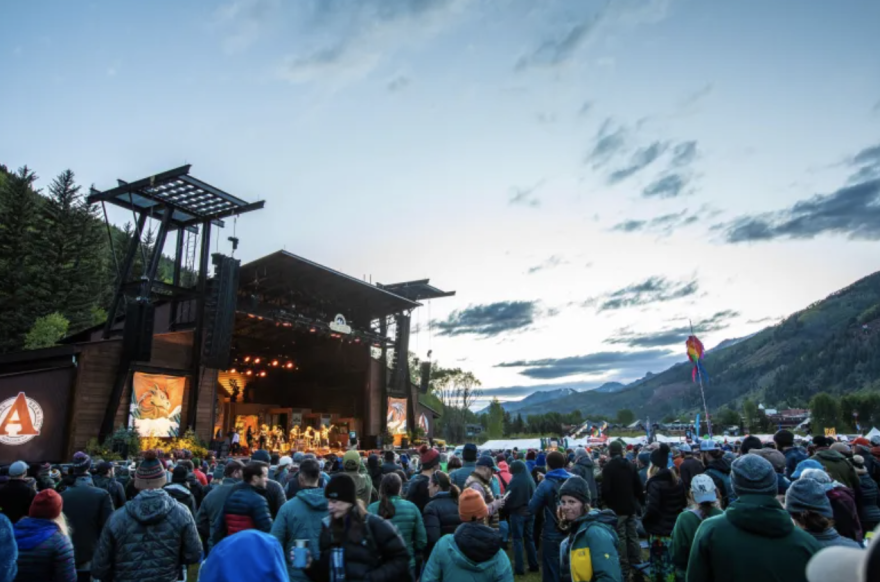The Colorado Sun originally published this story at 4:20 AM on December 16, 2023.
Last year, tickets to the Telluride Bluegrass Festival sold out in less than three hours. It was the 50th-anniversary festival, so organizers were expecting high demand, but when they scrolled social media later that day, they found a more insidious reason for the quick sales: ticket scalping.
“(Scalpers) have systems. They have bots and things set up that’ll just go on attack during a sale. They have so much force that they’re getting in before people that are actually like waiting in line with their one computer,” said Grace Barrett, director of communication and partnerships for Planet Bluegrass, the production company behind Telluride Bluegrass Festival.
Colorado is one of a few states with a law that actually and inadvertently protects ticket resellers by preventing venues and promoters from applying terms to the original purchaser of a ticket. In other words, once someone — or something — buys a ticket, they are free to do with it however they want.
In a 2023 bill, lawmakers tried to revise the lack of consumer protections by making it legal for venues to cancel tickets bought by bots or by individuals who have previously created fraudulent tickets. Gov. Polis ultimately vetoed it, but the Telluride Bluegrass team was taking notes.
“We looked at big festivals, like Coachella and Bonnaroo. But there wasn’t much there,” Barrett said. “Right now, we are wanting to do more (to combat scalping), and there isn’t a template for that.”
They ended up settling on a two-week pre-registration period, followed by a one-week scalper screening period.
Anyone who wants to attend the Telluride Bluegrass Festival in 2024 was instructed to purchase a $10 pre-registration ticket between Nov. 14 and Nov. 28. After pre-registration closed, Geoff Wickersham, sales and box office manager for Planet Bluegrass teamed up with See Tickets to weed out any suspicious registrants.
Telluride Bluegrass mails wristbands to its attendees, so one of the easiest red flags to identify was multiple email addresses leading back to one mailing address. Other red flags were using multiple credit cards for one email address, and computers with hidden IP addresses. Everything was done manually using “Excel wizardry,” Wickersham explained.
“It’s a pain-in-the-butt week, but it makes my whole year go so much better if everybody’s happy,” Wickersham said. “So it’s worth it.”
The anti-scalping experiment
On Dec. 7, the festival launched its first round of ticket sales. Anyone who successfully made it through the screening process received a code that morning, which they used to enter themselves in the main ticketing queue.
Last year, without the pre-registration process, there were 12,000 people waiting to scoop up tickets on the first day of sales — the festival’s maximum capacity is 12,000. This year, there were just under 6,000 people waiting.

During the screening period, about 150 accounts were identified as fraudulent or suspicious. Those accounts were refunded the $10 charge and sent a notice that they would not receive a ticket queue code. If an account was flagged in error — a typo in the email address, a misunderstanding about the rules — the festival team made sure it was corrected, as long as the registrant had a good explanation.
Finally, this past Tuesday, the festival team quietly removed the password barrier from the ticketing queue. “It’s not a secret,” Barrett said, but the team is still trying to avoid any marketing blasts that a scalper or software could pick up on.
The Bureau of Labor Statistics consumer expenditures report showed that last year, for the first time in five years, metro Denver households spent less on arts and cultural events than the national average — about 4.9% of overall expenditures, compared with the 5% national average. Attendance at cultural events has also declined from its pre-pandemic levels, down about 15% from 2019 in metro Denver and 22% elsewhere in the state.
A variety of factors contribute to these decreases, including inflation driving higher costs of living in general, but when talking about concert ticket prices, two factors are repeatedly brought up: service fees and secondary markets. (Telluride Bluegrass doesn’t charge service fees.)
Barrett said Planet Bluegrass is happy to sell out a festival, but prefers selling out to people who care about it, “people that have made a community around it,” Barrett said. “It’s really important that the tickets are in the hands of the festivarians. So, I would love to see more festivals, concerts and people doing this, but I guess we’ll kind of just see what happens.”
HELP US: If you’ve encountered any creative models to prevent ticket scalping or huge reseller markups, send Parker Yamasaki an email: parker@coloradosun.com. She’d love to hear about other venues and festivals getting creative — and promises to forward alternative models to the Telluride Bluegrass team.






